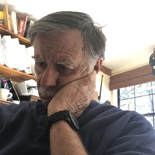 Christine Grant lives in the Scottish Highlands with her family and dog. She loves writing short stories and has almost finished a novel on the dilemmas faced by a young woman from a strict, religious background when she moves to London. 'The Concert' was developed from a passage in the novel. THE CONCERT Paul placed himself between Siona and the exit to the maths building. “Do you like classical music?” The sun shone through the glass doors behind him, making his ears appear reddish and almost transparent.
“I suppose so,” Siona said, not wanting to admit that she knew very little about classical music as it seemed the sort of thing you should like. Her father listened to country and western on the radio, although he would switch off with a sigh and a shake of his head if the songs touched on drunkenness or infidelity. Siona’s mother listened to the Psalms or old and crackly recordings of a second cousin who was a Mod gold medal winner and sung in the traditional Gaelic style. The cousin’s voice was as shaky and trembly as the worn tape. Neither of them had any patience for modern music and Siona hadn’t had the courage to try to find out what she really liked. “Do you like Mozart?” Paul asked. “Oh, yes.” Siona said this with more conviction, because she had watched the film 'Amadeus' with some other students from her hall. “This Friday, the London Philharmonic Orchestra is giving a concert: symphonies 39 and 40. I thought it would be a nice way to celebrate getting through the first term. What about it?” Students jostled past in a hurry to get to the next lecture. Siona squinted at Paul, shading her eyes against the sun. They had gone to talks on cosmology together and in a café afterwards they had had heated discussions about whether space was straight or warped. However, an invitation to a concert felt like a date. She didn’t want to hurt his feelings by turning him down, and wished she'd said that she hated Mozart. “I'm not sure. I'm getting the train back to Glasgow the next day.” “But you’ll still be here on Friday.” There was a touch of impatience in his clipped tones. “I'll need to pack on Friday night and get myself organised.” “Can't you pack beforehand? I've already bought the tickets and I won't be able to get my money back.” He sounded peeved. “It's just a small thing and I thought you’d enjoy it.” Siona experienced a brief flash of anger that he had already got the tickets, but immediately felt guilty about her lack of gratitude. He was right. It was just a small thing. She shouldn't read too much into it. “Okay, I'll go.” She stepped to the side to move past him, because he was still blocking the way to the door. “Thanks,” she added without much conviction. His mouth twitched upwards and he shot a glance at his watch. “That's sorted then. I'd better go. I’m running late for my next class.” # The next day, Siona waited until the last possible minute to go into her maths lecture. Paul was clever, polite, more knowledgeable than her and usually pleasant to talk to. However, she wanted, just for once, to break the habit of sitting beside him. She took a seat in the back from where she had a view of Paul's ash-blonde hair and reddish ears. He swivelled round, his glasses reflecting the overhead lights so that she couldn’t read his expression. As soon as the lecturer finished speaking, Siona squeezed out past two students who had arrived even later than her, and walked rapidly to her engineering lecture. Paul caught up with her at lunchtime when she was eating her sandwich in the common area. “I missed you in the maths lecture this morning.” It sounded almost like an accusation. She felt annoyed. He didn't own her. They didn't have any kind of arrangement to always sit together. He searched her face, as if he was uncertain of the outcome, and she felt guilty. He had been a friend, in a way, and perhaps she had been unkind. She said, “I was late so I just slipped in at the back.” # On Friday, she spent a lot of time trying to find the right clothes. She had to look as if she had made an effort and at the same time not wear anything which made her look as if she was trying to appear attractive. In the end, she settled on a pair of black trousers and a lobster pink shirt which was a birthday present from her mother. It didn't suit her, but it looked smart. She braided her hair and pinned it up at the back in a style which made her face look thin and severe. When they met in the entrance to the concert hall, Paul's smile was slow and appraising as if he were weighing up something he had just bought. He placed a hand on the small of her back to steer her over acres of deep red carpet and past cream walls with fancy plastered ceramics. Siona wanted to recoil, but it seemed rude to wriggle away after agreeing to come to the concert with him. When he handed over the tickets to the attendant at the door, she caught a glimpse of the price and wished she hadn’t; he had spent more on the tickets than her weekly food bill. They sat down in plush velvet chairs. Siona craned her head to take in the ornate plasterwork on the ceiling, and wishing that Paul would stop spoiling the moment by talking about the music they were going to hear in a voice that was just a little too loud. His tone conveyed both confidence and authority. No matter how knowledgeable she became, she would never be able to speak with such certainty. Now and then he leant towards her including her in his knowledge, “Of course, you know that Mozart ….” She had been afraid that he would discover her ignorance, but he seemed happy to talk. All she had to do was nod and smile. He didn’t notice or care that when it came to music, she couldn't interrupt and give her opinion in the way she did after science lectures. When the music began, he settled back in his chair and spread his legs so that his knee brushed against hers. She pulled her knees together and shrunk into herself, feeling as if her body was screaming, “Don't come any closer.” There was plenty to fill Siona’s mind: the music, the rapid flash of the musicians’ hands over their instruments and the people packed into the hall in quiet, rapt rows. However, every time she lost herself in the moment, Paul’s hand or knee brushed against hers, and she drew away. By the end of the concert, she felt as brittle as an autumn leaf from holding her body stiffly away from his. As they filed out into the lobby, she gathered all her energy and smiled. “Thank you for the lovely evening.” “Would you like a coffee?” “I need to get back,” Siona said. Her face felt tired from the effort of smiling. “We always go for a coffee after the cosmology lectures.” He sounded piqued. Siona felt bad about upsetting him after all the money he had spent on the tickets, and so she agreed. He led the way, turning into darker and quieter streets. “I think we’ve gone the wrong way,” Siona said. “It doesn’t look like you'll find a cafe around here.” “No, we’re in the right place. Only pubs are open at this time and I know you don't drink,” Paul went up a short flight of steps to a doorway. “So I thought we might as well come to my flat for a cup of coffee.” Siona felt her shoulders grow rigid and tight. Very few lights were on in the building. Perhaps everyone was in bed. “It’s too late. I need to get back. Where’s the nearest underground station?” Paul sighed, a long out breath that signalled his disappointment in her lack of trust. “If that’s what you want to do, but there’s no station near here. I’ll phone a taxi. Don’t worry. I’ll pay the fare.” He pressed a code to open the main door and looked back over his shoulder. “You might as well come in while you wait. You’ll be warmer inside.” He might have also added safer. Siona looked up and down the dark street and didn’t feel at all comfortable about standing there alone. She followed Paul up the stairs. His flat was just one room with a kitchen area at one end and a desk and sofa at the other. There were no flatmates to relieve the intimacy. He spoke into the phone and turned to her. “He says he’ll be at least half an hour. Maybe longer. They’re busy on Friday night. You might as well have a hot drink while you’re waiting.” To hide her nervousness, Siona tried to make conversation. “It must be nice to have your own place.” He spooned coffee grains into a coffee machine. “My parents bought this place when I came up here to study. It’s not big, but it’s all I need. Most of the people in the other flats work in London during the week and go home to their families at the weekend.” Paul said. “Take off your coat. You might as well make yourself comfortable while you wait.” Siona slipped out of her coat and shivered as she sat down. Paul brought over the coffee and sat so close that their legs touched. Siona shifted along, her coffee slopping over into the saucer, and Paul settled again, so close that she felt the warmth of his body. She couldn’t go any farther, because she was right up against the arm of the sofa. Science seemed a safe, neutral topic, and so she began talking about what her engineering lecturer had said about global warming. “I had a lecture about global warming today. It was just an introduction, because we’re looking at renewable energy next term. It’s scary how the carbon dioxide’s just been rising since the industrial revolution.” “Don’t listen to that stuff about global warming,” Paul said. “It’s a load of tosh put out by liberals to make us pay much more for our energy. Renewable energy might seem harmless, but it will ruin the environment. Think what our countryside would look like covered in wind turbines.” Siona was surprised by the vehemence with which he said this. “How do you explain the rise in temperature over the last fifty years if the climate isn’t warming?” “The climate’s always been variable. We’re going through a warm phase right now. Just be glad that we’re not going through another ice age.” He said this so dismissively that Siona didn’t have the confidence to argue further, or tell him that when she saw the slides on wind turbines and solar heating systems, she had experienced a quiet moment of recognition; this was what she wanted to do when she finished her degree. He placed his hand on her shoulder and gave it a squeeze. It could have been a friendly, reassuring gesture, but her body tightened, and she squirmed away saying, “I’ll just look out the window and check if the taxi’s here.” “Don’t bother. He’ll buzz at the door when he’s ready.” He told her how much his father would make on this flat when he sold it in four years’ time while his hand crept back. She felt guilty about appearing unfriendly or ungrateful and tolerated the weight of his hand on her shoulder. As he talked, as his hand slipped down her side and over the curve of her waist, grazing past the edge of her breast on the way. She hunched her shoulders and shrank into her core, disassociating herself from the feel of his fingers on her skin and trying but failing to follow what he was saying about carbon capture. Maybe he was just being pally, but surely he could tell from her body language that she was uncomfortable. His hand crept down further and rested warm and hard on the curve of her buttocks. It was like the feel of a wasp creeping on her skin, or nails scraping across a blackboard. She leapt up and screamed, “Stop it!” He blinked at the strength of her reaction and stood up too, placing himself in front of her. “I thought you wanted this.” “I didn't. I never wanted us to be anything more than friends.” “You’ve been happy enough to let me take you out to a concert and bring you here for coffee.” “I thought you just wanted a friendly night out to celebrate the end of term.” A muscle moved between his mouth and his ear and he spat out the words. “Friends pay their own way.” Her skin crawled, hot and prickly, as if each cell was on alert. A suffocating fear settled on her chest. She wanted to run, but her legs felt weak. No-one knew that she was here. Even if she yelled for help, the sound would be absorbed by the empty flats above and below. She had willingly walked into a trap. She forced herself to breathe quietly, digging her nails into her palms with the effort to appear calm. “I’m sorry if I gave the wrong impression. Please let me past. I’ll find my own way to the underground.” For a long moment he looked at her, his face flushed. He turned away and said, “If that’s the way you feel, then just go.” She ran as fast as she could, down the stairs and along the street. The tube station wasn’t far away at all; she reached it within five minutes. # She finished packing in a daze, stopping at intervals to rock back and forth, trying to block out memories of the evening. Every time her mind drifted toward sleep, she jolted awake with a memory of Paul’s fingers creeping down her side. She curled up into a ball, retreating deep inside as she shrank away from the memory of unwanted touch. A few hours later, she sat on the Glasgow train with her cheek pressed against the cool glass of the window. Railway embankments, suburbs, industrial parks, waste ground and rain-sodden fields slid by beneath a grey, clinging sky. She felt apprehensive about going back to visit her parents, because she had changed so much in the last few months. By the time the crowded train jolted its way through the Midlands, Siona began to feel anger with herself, Paul, and her sheltered, respectable upbringing. When she met people who didn’t mean well, she was disastrously ill-prepared to deal with them. She had been trained to be kind and helpful and do her best to please. At times, she was even expected to be compliant to the point of sacrificing her own interests. No-one had told her how to look out for herself. She wondered how she could have been so naïve as to think that she would be safer inside his flat than trying to find her own way to the station. Deep down she had known that Paul was trapping her, but she had overridden her instincts and colluded in the pretence that his intentions were nothing but friendly. As the train drew into Glasgow Central, Siona spotted her parents waiting on the platform. Her father pulled impatiently at his greying, ginger beard, and her mother appeared anxious as she scanned the passengers leaving the train. She waited a moment, and then took a deep breath and stepped out. Her father clapped her on the back as he took her bags. Her mother hugged her and then held her at arm’s length to look at her. “You haven’t changed at all, a ghraidh. How are things going?” “Fine.” Siona couldn’t quite look her mother in the eye. She was no longer the innocent girl who had left them, but perhaps that was a good thing.
0 Comments
 Sravani Singampalli is a published writer and poet from India. She is presently pursuing doctor of pharmacy at JNTU KAKINADA university in Andhra Pradesh, India. THE FEAR THAT NEVER GOT ERASED |
Categories
All
|

 RSS Feed
RSS Feed